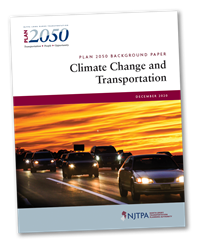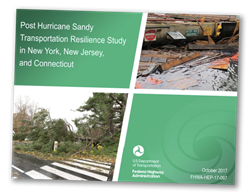Climate Change and Resilience
 Transportation activity in the NJTPA region produces substantial greenhouse gas (GHG) emissions, contributing to climate change. On-road transportation in the region is responsible for an estimated 28 million metric tons (MMT) of CO2 equivalent (CO2e), 28 percent of total statewide emissions.
Transportation activity in the NJTPA region produces substantial greenhouse gas (GHG) emissions, contributing to climate change. On-road transportation in the region is responsible for an estimated 28 million metric tons (MMT) of CO2 equivalent (CO2e), 28 percent of total statewide emissions.
The expected impacts of climate change are more extreme storms, increased precipitation, hotter summertime temperatures, and rising sea levels. These weather-related impacts and rising sea levels threaten the region’s mobility and transportation infrastructure. Therefore, the NJTPA recognizes that the region must do much more to reduce GHG emissions and become more resilient to the effects of climate change.
As part of its climate change and resilience efforts, the NJTPA is currently working to:
- Conduct regular on-road transportation GHG inventory updates and explore new methods to track GHG emissions from the transportation sector.
- Advance transportation-related GHG mitigation efforts such as providing information on our EV Resources Hub Site to further electric vehicle adoption and developing a Carbon Reduction Strategy.
- Study the impact of extreme weather on the transportation system and advance resiliency measures.
- Collaborate with partners on GHG accounting, mitigation, and climate change adaptation issues. One notable collaboration is the US EPA’s Climate Pollution Reduction Grant (CPRG) Program Planning Grant, an initiative to prepare climate action plans for the New York-Newark-Jersey City NY-NJ Metropolitan Statistical Area (MSA). To learn more, visit the NY-NJ MSA CPRG Hub Site.
The NJTPA conducts research, studies, and plans to address climate change issues. These include:
 Plan 2050: Climate Change and Transportation Background Paper (2021)
Plan 2050: Climate Change and Transportation Background Paper (2021)
As part of the NJTPA’s long-range transportation plan Plan 2050, the NJTPA prepared a background paper on Climate Change and Transportation. The paper covers existing conditions, climate projections and associated impacts, the public sector response, and key strategies for NJTPA and Plan 2050. There is also section about climate change on page 86 of Plan 2050.
Passaic River Basin Climate Resilience Planning Study (2019)
The NJTPA prepared this study to evaluate the vulnerability of New Jersey’s Passaic River Basin (PRB) transportation assets to climate change extreme weather events and identify adaptation strategies for agencies and municipalities to integrate resiliency into the transportation network. The study consisted of a vulnerability assessment of the area’s transportation system, projection of future climate risks for the PRB, and adaptation strategies for critical transportation corridors and assets. It recommended actions and strategies to protect the transportation system from damage and disruption.
NJTPA’s Alternative Fuels Vehicles Readiness Plans and Guide (2017)
National attention to alternative fuel vehicles (AFVs) has grown, primarily because of their potential health, environmental and economic benefits. Efforts to encourage the increased use of AFVs, particularly electric vehicles, are taking place at the national, state, and local levels. The NJTPA developed several publications that address what AFVs are, their benefits to the region, efforts taking place in New Jersey to promote them and how to develop a plan for their use.
 Post-Hurricane Sandy Transportation Resilience Study of NY, NJ, and CT (2017)
Post-Hurricane Sandy Transportation Resilience Study of NY, NJ, and CT (2017)
This research project, led by the Federal Highway Administration (FHWA), examined the impacts on the transportation system from Hurricane Sandy, Hurricane Irene, Tropical Storm Lee, and Nor'easter Alfred. It also discusses Climate Data and Analysis Tools, Assessing Vulnerability, Risk, Adaptation Options in the Tri-State Metropolitan Region, and Integrating Climate Resilience in Transportation Decision-making.
NJTPA Regional Greenhouse Gas Mitigation Plan (2013)
The NJTPA Regional GHG Mitigation Plan analyses over two dozen strategies for their effectiveness in reducing GHG emissions, including land use policies, enhanced Transportation Demand Management measures, electric and alternatively fueled vehicles, and active corridor management strategies.
Region-wide Greenhouse Gas Emissions Inventory Project (2011)
The NJTPA conducted a comprehensive GHG emissions inventory and forecast (I&F) for the NJTPA region. Project goals were to: develop a region-wide inventory of GHG emissions for a base year; allocate GHG emissions to the county and municipality level; forecast GHG emissions for 2020, 2035 and 2050; and assist sub-regions in their greenhouse gas mitigation and adaptation efforts.
Vulnerability and Risk Assessment (2010)
In 2010, a partnership of New Jersey state agencies and Metropolitan Planning Organizations was awarded a grant from the Federal Highway Administration (FHWA) to conduct a Vulnerability and Risk Assessment of transportation infrastructure from the impacts of climate change. The primary objective of this project was to pilot FHWA’s Vulnerability and Risk Assessment Conceptual Model using New Jersey as a case study. This pilot provided feedback for advancing the Conceptual Model and developing a greater awareness and understanding of the potential effects of climate change on transportation infrastructure in New Jersey.